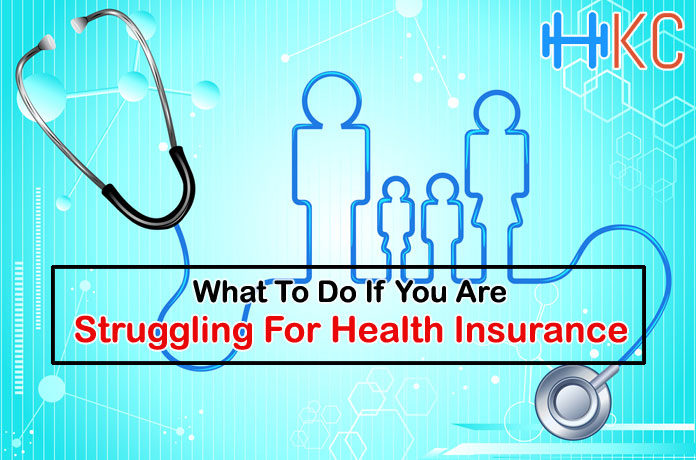
What To Do If You Are Struggling For Health Insurance
What health insurance do you have? Is it sufficient? Will it cover everything you need?
These are all questions that run through the mind of pretty much every American.
Even though they’re common questions, our gut reaction is usually to bury our heads in the sand and just hope that everything will turn out okay.
This works for a while but once the proverbial brown stuff really hits the fan, it’ll be too late to do anything about it…
So why don’t we try something different?
We’ve put together some things to think about when you’re sorting out your health insurance, to keep you on the right track and help you make sure you have what you need.
What If I’m Stuck With No Insurance?
What if you are one of the millions of Americans who fall between the gaps in terms of health insurance? Are you not getting the insurance you need from your job but not eligible for state aid health insurance?
If this is you, find out if the Affordable Care Act (Obamacare) is available in your area. This is important, since it’s not covered by all states. If it is available, then look more closely at the coverage that’s available. It might be the ideal fit for you.
If this won’t work, then there is some provision for assistance or health insurance exchange in all states, if you’re on a low or middle income. Research what’s available in your state and find out more about what your options are.
If you still can’t get the combination of state assistance and employer provided insurance, you can still get basic and/or emergency medical help through community health clinics.
The waiting times can be long and the treatment might not be as thorough, but this is a good alternative to not giving your health the attention it deserves.
What Should I Look For In Health Insurance?
Assuming you are able to get health insurance, it’s vitally important to know exactly what you’re looking for in terms of a health insurance provider.
All policies are not created equal!
If you boil it down to basics, the more you want out of a policy, the more you (or your employer) pay for it. It’s up to you how much risk you’re willing to take if you want to lower your payments.
The type of policy that you choose is also important. If you go with a PPO – Preferred Provider Organization – then you can choose your ‘preferred provider’, as the name would suggest. This gives you a bit more freedom with your healthcare.
However, an EPO – Exclusive Provider Organization – means that you have to stick with the provider given to you, except in an emergency. There’s also a POS (Point of Service plan), which means you need to stay in-house for all medical coverage.
As well as the type of policy you choose, make sure you understand the limits your policy might have, whether these are financial or time-based. Is there a limit set on the costs of procedures that will be covered? How long will those procedures be covered for? Don’t let yourself be caught out, check it out ahead of time.
Last thing to be aware of – find out if your health insurance policy will cover you if you are out of your home state/area. Finding out that your insurance doesn’t cover you when something bad happens on your travels is not an experience I would recommend!
If your policy doesn’t cover you, then consider taking out travel insurance for those fun holidays, making sure it covers things like pre-existing conditions. Then you can just kick back and relax!
Are There Alternatives To Private Health Insurance?
Yes! They’re good to know about, just in case.
If you’re considering moving somewhere like Canada or Great Britain, they have free healthcare for all citizens and legal residents. However, not everyone is jetting off any time soon!
The Affordable Care Act (Obamacare) was discussed earlier but there are also health insurance exchanges where you can swap one policy for another. Be careful, though. It’s usually quite difficult to get a better policy exchanged for a poorer one.
For those who qualify, Medicare is available and covers most of what a regular health insurance policy covers. However, it’s always best to check exactly what is there. Just in case.
There are so many providers that work with Medicare recipients, it’s easy to find the treatment or insurance that works best for you.
What Does My Employer Offer Me?
It’s important to look very carefully at what exactly your employer offers you as part of a health insurance plan.
I’ll say it again – check what your employers offer you as part of a health insurance plan!
These plans don’t always cover everything, so take the time to make sure your insurance works for you. Your needs won’t be the same as your colleagues.
Does your employer pay for all of your insurance plan? Or do they take a portion of your paycheck? Can you choose how much you pay in? These are some important questions to start with if you aren’t sure.
Find out what kind of plan your employer is offering. We discussed a couple of plans that are available earlier, so think about how important choosing your doctor is to you. That will help you know what plan is your perfect fit.
Depending on your situation, you should also find out if your healthcare insurance plan will cover your partner or children. If so, then great. If not, then you’ll need to make other arrangements as a family to get the cover you need.
Making sure you get the right insurance for you is important and you might find that a better alternative could be to move to a new job that offers a better insurance package. Sometimes taking on a lower salary coupled with an excellent insurance plan can work out better for you in the long run.
If you get some answers to these questions but they still aren’t quite what you’re looking for, it might be a better to take care of your own insurance.
Should I Consider Paying For My Own?
Since healthcare insurance is such a personal thing, organising your own might be the perfect choice for you.
This is particularly relevant if you’re a freelancer or self-employed, since you don’t have an employer paying into a healthcare insurance plan.
There are lots of options available, so some research will be needed on your part to find out what you need and who to get your insurance from. Generally, it’ll be paid month-by-month directly from your bank account.
Although this might seem a scary task, getting the insurance that works for you is really important. Don’t be afraid! Taking the plunge and looking into your options is much better than getting caught short further down the line.









































